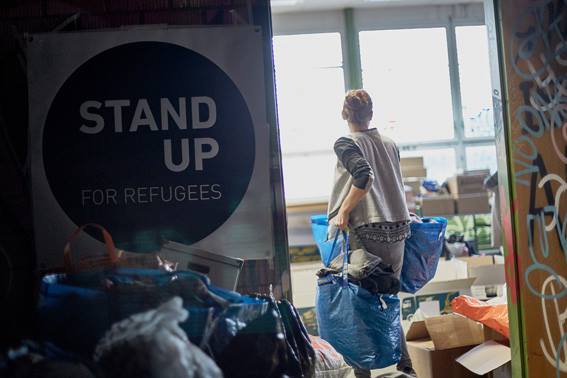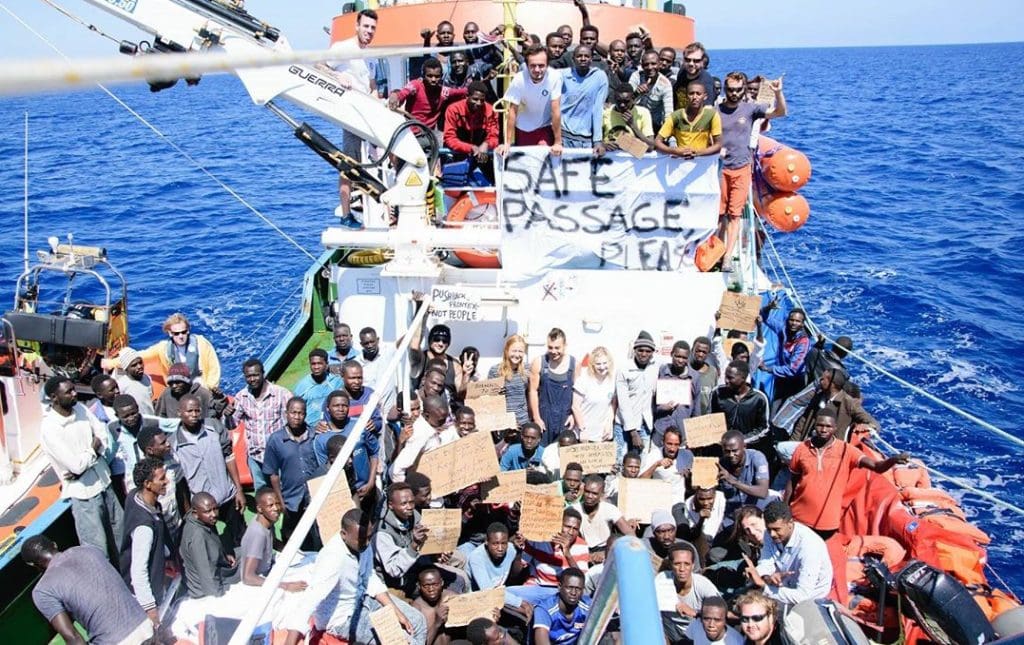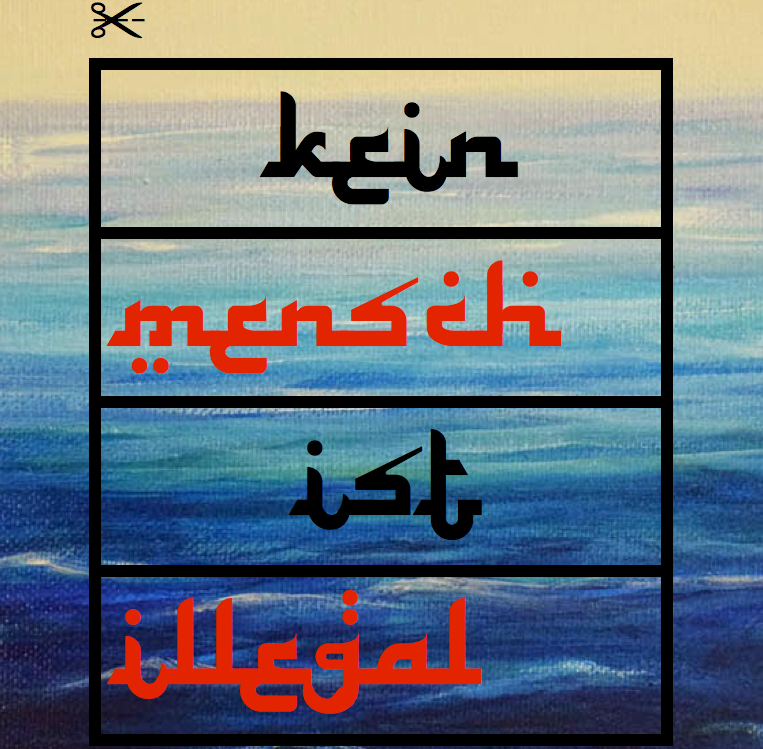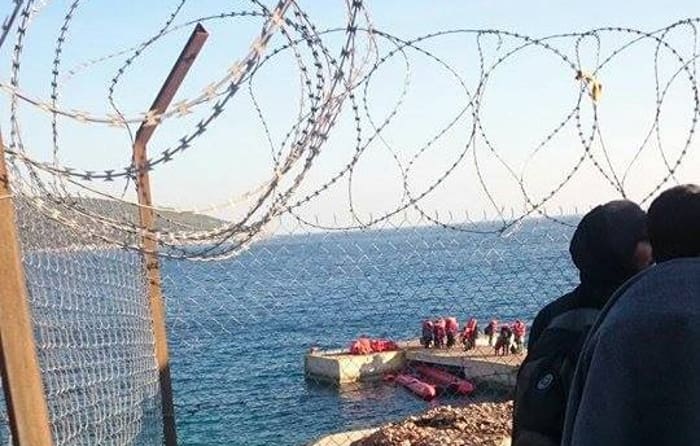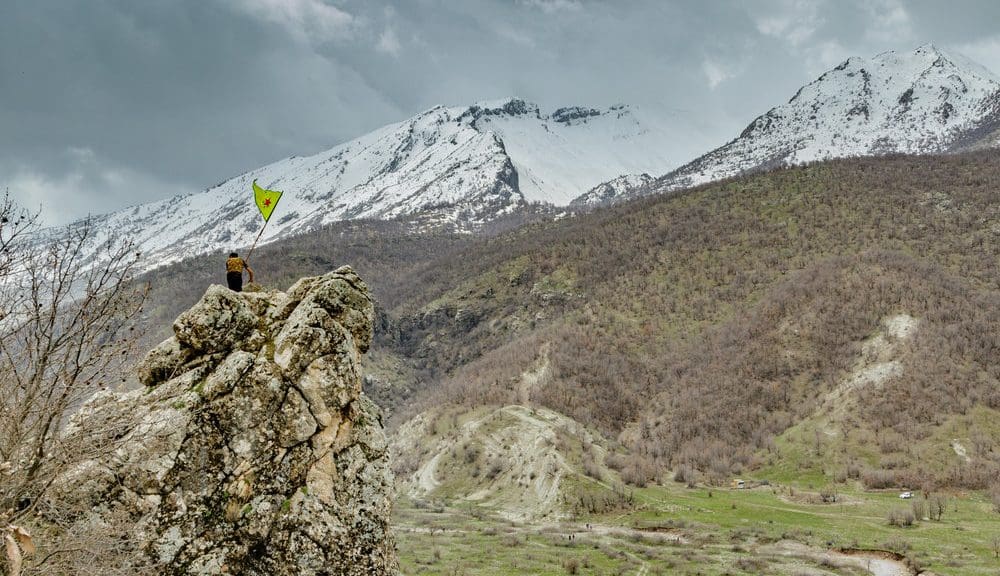AntiNote: the following is an interview that crimethInc’s Ex-Worker podcast included in their episode #43, Borders and Migration, Part I: Europe’s “Refugee Crisis”, released on 7 December 2015.
Alexandra has shared some very important and difficult thoughts with the Ex-Worker about her experiences on the Balkan route, from well before the precarious situation in the region was christened such. Her insights are for us especially crucial to sit with and consider as we prepare for our own participation in solidarity efforts “on the field.” As we imagine that our readers are motivated and engaged and either already working on the field, preparing a trip, or looking for ways to contribute from afar, we present these insights to you in the same spirit. Let us learn from her experiences and build on them.
The Ex-Worker publishes full transcripts in parallel to every audio episode they release. We present here only a tiny fraction (lightly edited for clarity) of the impressive document that is the transcript of episode #43. We encourage you to power through the whole thing, or (probably more enjoyable), listen to it.
Alanis: We wanted to hear from some radicals and anarchists directly involved in migrant solidarity struggles at the moment in Europe, so we put out some feelers. Many of the people we contacted were so busy with support work on the ground that we couldn’t set up interviews. But we did manage to catch up with a few folks who shared some valuable perspectives on what’s been going on with migrants in Europe and how anarchists have been responding.
We’ll now share a longer interview with Alexandra, an anarchist from Switzerland, who discusses her experience doing direct migrant solidarity work in Hungary and elsewhere, and her reflections on how her experiences on the ground confronted and sometimes conflicted with her anarchist visions.
The Ex-Worker: Alexandra, thanks for talking with us!
Alexandra: I’m happy to talk to you.
The Ex-Worker: You’ve spent some time in Röszke, Hungary, which has been one of the “hot spots” around conflict and solidarity with migrants in Europe recently. Can you talk a little bit about what you experienced there, why in particular these places have become so significant recently, and what kind of solidarity efforts are happening there?
Alexandra: I was with a group of people in Röszke in the middle of September—this is at the border between Serbia and Hungary. At the point when I was there, there was still an open space in the border where people could go through on the way to Western Europe, over Hungary.
What I think is important for context is that the situation is extremely volatile and chaotic at the moment in the Balkans, so the place where I was, Röszke, doesn’t exist anymore like it was then, because the border there is closed now. But other places, which are very similar but are just at a different spot on the map, have opened now. So just in case people would want to go and support the migrants, this place is basically not a hotspot anymore, but was one when I was there.
At the moment in Europe we’re having one of the biggest refugee crises, and people migrating, in a really long time. Just to get an idea of the number of people we’re talking about: this year, about 600,000 people have come over the sea trying to get into Europe. Over the first part of the year, most of them came over Italy or Spain, and then during summer the route changed into the Balkans. This year about 400,000 people went through Greece and then tried to get through the Balkans, mostly over Serbia, Croatia, and Hungary, trying to get to Western Europe. So we are really talking about masses and masses of people. Most of these people come from somewhere in the Middle East region—from Syria, Afghanistan, and Iraq—but there are also people from sub-Saharan Africa.
Röszke is on the Serbian-Hungarian border. It’s a really, really tiny town, which is about fifteen kilometers from the third biggest city in Hungary. Basically, people were going through a hole in the border, because Hungary is building a big fence around the whole country, and there were railroad tracks so people could still pass the border there relatively easily and were trying to get into Hungary to go further into Western Europe.
While I was there—about one and a half weeks—between 2,000 and 9,000 people came over the border every night. And when they walked over the border, what migrants would see was a camp with lots of tents and police and buses. This was one of the biggest worries of the people crossing the border, because they had no idea what would happen to them. One of the first interactions with them was always the question, “will they fingerprint us?” Many of the migrants are really afraid to have their fingerprints taken—which has to do with the Dublin treaty, which we might talk about later, which means once they’ve been registered they can be sent back to the first entry country in Europe.
In the particular camp where I was, the Hungarian state did not fingerprint people, but was trying to convince them to get onto buses because they wanted to bring them to registration centers. But people were not forced to go on the buses, so they theoretically had a choice to strike out on their own. This is very much theoretical, because most of the people have been fleeing for weeks; they were very tired, they were ill, they had very little energy left, so it was really, really hard for them, I often had the impression, first to get information, but also to make decisions about where they wanted to go and what was the best thing to do.
This is one of the places where we stepped in with the work we’ve been doing in our group. We decided to supply electricity and internet to the migrants and also a place for tea and coffee for people to just be there, relax for a moment, have a warm drink, and just feel human for a moment again, and also have some social interactions.
At first this idea of providing electricity and internet might sound a bit odd—many people have reacted when I first told them, they found it a bit strange—but this was actually a really important thing to do, because the people who are trying to cross the border have very, very little information, and all the information they normally get en route is by personal encounter with people they meet. So it’s really hard to judge what is true or not.
Getting them electricity to charge their mobiles and giving them access to internet gives them the possibility to have more decision power about their lives, to get information from different places; but it also gives them a possibility to be in contact with each other. Also, very often, many of these people have a chance to talk to their relatives or family in their country of origin, or to other people who are fleeing, who they might have lost and have had no contact with for a long time. So it is also human interaction. I think those are things which are very empowering for people.
We were also trying to give them other information than the information that was provided by the big NGOs—like UNHCR or the Red Cross—and the police, which was a hard thing to do, because very often it was really clear that they were also not sure that they could trust us, which I could understand really well, because you really don’t know who you have in front of you, and what the basis is of the information they’re giving you.
The Ex-Worker: Switzerland is obviously in a different situation in respect to refugees, since it is not an EU member state and has a distinct history of autonomy, even isolation. How is the Swiss government responding to the refugee crisis, and what are some of the popular sentiments in Swiss society about refugees and migrants?
Alexandra: Being in Röszke, I also talked with migrants directly about Switzerland, the country where I was born, and I found it rather interesting that most people that I talked to (and obviously it wasn’t that many) had never heard of Switzerland. I very often asked, “Where do you want to go?” and would suggest, “What about Switzerland, my home country?” Most of the people I talked to had no idea where this tiny country was on the map of Europe.
You were saying that Switzerland is in a bit of a special situation, because we are not part of the EU, but in the context of refugees, it doesn’t really make a difference, because Switzerland is part of the Dublin treaty and is part of the Shengen area, which is like the outside border of the EU, so there aren’t really many special regulations for Switzerland. In that sense Switzerland is just like any other European country.
What is very true is that Switzerland has a very restrictive asylum system. It’s really, really hard in Switzerland to seek permanent residency, or get a Swiss passport. And, also as in many other European countries, we have a government which is partially made up of rightwing and far-right parties—and also in our country I see a big movement with many people talking a lot more about racist or also fascist ideas.
But I think the biggest issue is that Switzerland is one of the countries that doesn’t have an outside EU border. When refugees come to Switzerland, we are sending them back to Italy, or also to Hungary, or those countries which do have outside borders with the EU, so we are definitely a big deal in the whole situation of this Dublin treaty.
The Ex-Worker: For some background for our listeners about European policies around refugees and asylum seekers, can you explain a bit more about the Shengen system and the Dublin Agreement?
Alexandra: Basically, the Shengen area in Europe is an area which defines and controls the outside borders. On the inside, Shengen countries don’t really do border controls between each other, so basically when you are traveling between Austria and Germany for example, until recently there was no border controls, or no real border anymore. The “European” (Shengen) border is further outside, like (at the moment) between Slovenia and Croatia, or between Hungary and Croatia.
This is important for the context of refugees trying to get into Europe: once they pass this Shengen border, they are actually inside of Europe. Then they can apply for asylum, but they have to apply for asylum in their first country of entry, normally one of the outside borders countries, like Slovenia or Hungary at the moment. This also means that when, for example, they come by airplane, or by ship, this could be France, or Spain, or also Switzerland (though this is really unlikely because we are in the middle and it’s really hard for this to be your first country of entry).
Now, this might sound like a rather reasonable idea. But it’s not really reasonable at all (besides the point that borders are not reasonable). The problem is that once you’re registered in the first country you entered in Europe or the Shengen area, if you continue to another country—for example, you entered in Hungary, you got registered, but then you decided to go to Germany and you want to apply for asylum there, Germany will send you back to Hungary, saying, “We won’t take you because your first point of entry was Hungary.”
So what’s actually happening in Europe is that there’s a lot of pressure on Shengen periphery countries to have lots of asylum-seekers, and very often those are also countries which are economically not so well-off, like Spain and Italy and Slovenia and Hungary. So it’s also a protection system for the richer European countries.
One thing which I’ve also seen in Switzerland in the last couple weeks, due to this media attention, is that there are also a lot of people trying to get involved in the refugee situation, who are touched by the people who are now fleeing over the Balkan route. There are a lot of children who are fleeing, which also for me has been a really heartbreaking thing—to have babies in your arms that you are not sure if they will survive because they were so cold. People have been reacting to that, and there has been a lot of solidarity in the form of mutual aid: people self-organizing big convoys, going to the Balkans themselves and trying to support these people.
So there’s also a positive thing going on, though it’s just very few people. It’s really clear that the states and the big NGOs are failing, so there have also been lots of people who have decided, with the idea of mutual aid, that they would do something and they would like to support the refugees. So there are both sides.
The Ex-Worker: What are some examples of anarchist or radical solidarity projects that cross borders, connecting migrants and activists in different European countries? Are there examples of solidarity efforts connecting people in the countries from which many migrants are leaving to the countries to which they are arriving?
Alexandra: There are some projects that are working on that. In Geneva, there is a movement at the moment which is called “Stop Bunkers,” which was created by migrants who were seeking asylum and were living in underground bunkers. They didn’t want to live in them anymore, and they started to protest, and also started to do political work on it. And they have been supported by local radical and anarchist groups, more in the sense of logistic and legal aid, but the asylum-seekers were really leading the struggle, and it was really clear that it was them leading the struggle.
I don’t really know of that many examples that are like that. Also very often the experience is that it’s really hard to do, as well. Hard in different senses: trying not to instrumentalize migrants for your own political ideas is a big issue. Or also, for example, how do you deal with it when migrants decide to make liaisons or connections with organizations like parties, which you yourself would never do? How do you react to that, how much do you tell them what to do or not to do?
At the same time, there are lots of projects that have come up which don’t have such close connections with migrants themselves but are still related to their struggle, like “Watch the Med,” which is an organization which started something called the Alarm Phone about a year ago. It’s a hotline for boat people in distress. They’re trying to help people who call from on the sea—maybe something is wrong with their dinghy or boat—they’re trying to help them make sure that the coast guards really come to rescue them. It’s a big issue that very often the coast guards don’t react quickly enough, and many people die a totally unnecessary death because the reaction wasn’t quick enough, so Watch the Med is trying to put some of the pressure they can exert as western Europeans to work supporting refugees in that sense.
Obviously in the whole Balkan area there are lots of no-border groups, there have been countless kitchens cooking food for migrants on their way to Europe. So lots of support has been going on, but unfortunately not much support which has a really close connection to migrants. Still, I think this is something that will be worked on now that people are arriving in Europe, because the people who are at the moment undertaking their journey and fleeing their country of origin are mostly not in a state to have any energy or priority for political fights.
The Ex-Worker: What are some of the largest obstacles you face in your struggles to show solidarity with migrants? What advice would you offer to non-migrants who want to act in solidarity with migrants, in Europe or even here in the USA or Canada?
Alexandra: I think one of the largest obstacles, something I put a lot of thought into before I went to the Balkans is that I felt I had a lot of clear, anarchist political ideas in my head about how things should be, and what is right, and how I want it and how I see the situation. But I think everything changes really radically when you have a freezing baby in your arms.
In that moment, I was thinking mainly about the act of just helping people, and not thinking that much about political things. And sometimes it also haunted me, because there are difficult situations when you are at a camp like that; you become a bit like a part of the machinery also, a part of the asylum system, because it was really clear that the authorities who were there wanted to get the people on the bus to the registration place. Nobody asked a migrant what they want or what their decision is.
It’s really clear that the border is there and that you’re supporting the border in a way, in that people are being sent to the next border where they’re taking over. You’re standing in front of the border; you’re not destroying it, you’re not deconstructing it, you’re just helping people, seeing that they have enough food or water and get medical care. There is a lot of thinking to be done about this differentiation between your ideas and the reality, which also I think has already led to really fruitful discussion in general.
Then other positive things: thousands of people are doing support to migrants and are not linked to any government or any NGO, but just doing self-organized work and helping people flee over the border. This has also been done in a very direct way, like people just taking a car and driving people to or over the border; just making sure that the gap existed that people could go through, or otherwise presenting ways for people to reach their goal.
For me those are also very strong actions, and sometimes also very direct actions; and a lot of people have been doing things like that who would not normally classify themselves in an anarchist or radical way. I totally would classify them that way, with what they have done. So I think this is a chance for people to experience how self-organization can work and does work.
The Ex-Worker: Can you describe an anarchist or radical strategy for how we might respond to the border/migration crisis, and a vision of a free world beyond the system of national borders?
Alexandra: This I think is the hardest question; and no, I don’t know the strategy for how we might respond and react to this crisis. I think for me one of the main things has been doing something which I felt was indeed supporting, but still giving people as much possibility to make their own decisions, or also help them make their own decision, and helping them have a possibility to do what they think is right for them.
And yes, I think I have a really clear vision, like you already said, of a world beyond the system of national borders. But how to get there, I have absolutely no idea. Maybe that sounds a bit frustrating. But I hope on the way of doing active things, and really just trying things out, we will find a way.
Featured Image: Stand Up For Refugees (Facebook)

